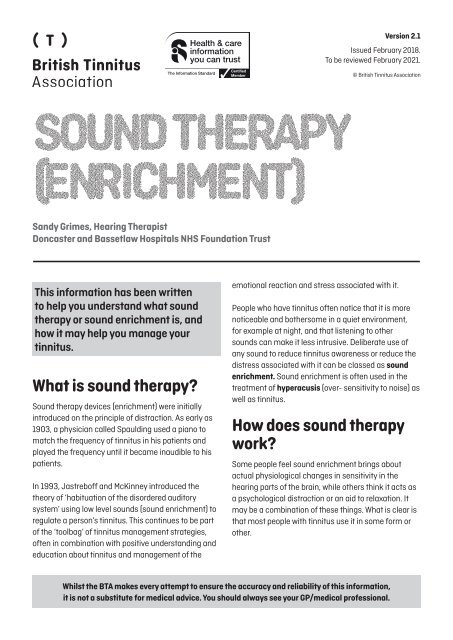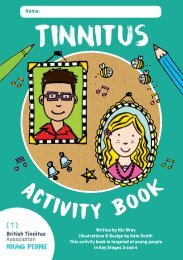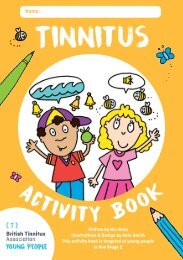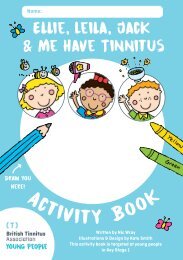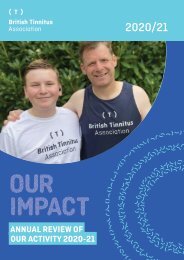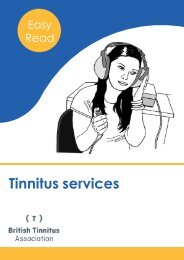Sound enrichment (therapy) Ver 2.1
You also want an ePaper? Increase the reach of your titles
YUMPU automatically turns print PDFs into web optimized ePapers that Google loves.
<strong>Ver</strong>sion <strong>2.1</strong><br />
Issued February 2018.<br />
To be reviewed February 2021.<br />
© British Tinnitus Association<br />
SOUND THERAPY<br />
(ENRICHMENT)<br />
Sandy Grimes, Hearing Therapist<br />
Doncaster and Bassetlaw Hospitals NHS Foundation Trust<br />
This information has been written<br />
to help you understand what sound<br />
<strong>therapy</strong> or sound <strong>enrichment</strong> is, and<br />
how it may help you manage your<br />
tinnitus.<br />
What is sound <strong>therapy</strong>?<br />
<strong>Sound</strong> <strong>therapy</strong> devices (<strong>enrichment</strong>) were initially<br />
introduced on the principle of distraction. As early as<br />
1903, a physician called Spaulding used a piano to<br />
match the frequency of tinnitus in his patients and<br />
played the frequency until it became inaudible to his<br />
patients.<br />
In 1993, Jastreboff and McKinney introduced the<br />
theory of ‘habituation of the disordered auditory<br />
system’ using low level sounds (sound <strong>enrichment</strong>) to<br />
regulate a person’s tinnitus. This continues to be part<br />
of the ‘toolbag’ of tinnitus management strategies,<br />
often in combination with positive understanding and<br />
education about tinnitus and management of the<br />
emotional reaction and stress associated with it.<br />
People who have tinnitus often notice that it is more<br />
noticeable and bothersome in a quiet environment,<br />
for example at night, and that listening to other<br />
sounds can make it less intrusive. Deliberate use of<br />
any sound to reduce tinnitus awareness or reduce the<br />
distress associated with it can be classed as sound<br />
<strong>enrichment</strong>. <strong>Sound</strong> <strong>enrichment</strong> is often used in the<br />
treatment of hyperacusis (over- sensitivity to noise) as<br />
well as tinnitus.<br />
How does sound <strong>therapy</strong><br />
work?<br />
Some people feel sound <strong>enrichment</strong> brings about<br />
actual physiological changes in sensitivity in the<br />
hearing parts of the brain, while others think it acts as<br />
a psychological distraction or an aid to relaxation. It<br />
may be a combination of these things. What is clear is<br />
that most people with tinnitus use it in some form or<br />
other.<br />
Whilst the BTA makes every attempt to ensure the accuracy and reliability of this information,<br />
it is not a substitute for medical advice. You should always see your GP/medical professional.
<strong>Sound</strong> <strong>enrichment</strong> can be used as a self-help<br />
technique or as a component of a broader tinnitus<br />
management programme delivered with the support<br />
of a hospital or clinic.<br />
Research studies have found it plays a less important<br />
part than counselling in bringing about improvements<br />
in people’s tinnitus, so it is perhaps best to regard it as<br />
one tool amongst several you might use, rather than a<br />
solution in itself. That said, using sound <strong>therapy</strong> is one<br />
of the easiest practical things you can do for yourself<br />
if you don’t need professional help or are unable to<br />
access it.<br />
Types of sound<br />
<strong>enrichment</strong><br />
<strong>Sound</strong> <strong>enrichment</strong> can be provided by:<br />
environmental sound (such as having a window open)<br />
a CD or mp3 download or the radio<br />
a smartphone App<br />
bedside/table-top sound generators<br />
a wearable sound generator<br />
The last four can all provide natural sounds, ‘white<br />
noise’ or gentle music. There are also hearing aids with<br />
supplementary tones and sounds delivered with the<br />
amplification. These are available on the NHS in some<br />
areas.<br />
The type of sound <strong>enrichment</strong> suitable for you depends<br />
on your personal circumstances and your preferences.<br />
Most people get on best with a sound that doesn’t<br />
demand too much attention and is not unpleasant to<br />
listen to.<br />
Environmental sound<br />
Many people find that some background sounds, for<br />
example distant traffic, the hubbub of a busy office,<br />
wind in the trees, or waves breaking on the seashore<br />
make tinnitus less noticeable. At times, just opening<br />
a window may provide all the sound <strong>enrichment</strong> you<br />
need. Other alternatives could be a fan in the bedroom<br />
or a ticking clock.<br />
CDs and downloads<br />
There are a number of CDs of relaxing music and<br />
nature sounds available from various sources. Many<br />
local libraries have some available for loan, so you can<br />
try a few out. The BTA sells a number of good quality<br />
natural sound recordings and neutral noise CDs which<br />
can be ordered online or by phone.<br />
A wide range of nature sounds can also be<br />
downloaded from various websites to be played on<br />
mp3 players or other portable devices and mobile<br />
phones and many of these are free. For example, the<br />
website www.freesfx.co.uk/soundeffects/nature has<br />
sounds available to download for free for personal use.<br />
Bedside/table-top sound<br />
generators<br />
These portable machines sit on the bedside/table-top<br />
and provide a choice of soothing sounds at the touch<br />
of a button. You can adjust the volume to suit your<br />
hearing. There is also a timer on them to switch off<br />
once you are asleep. Most can be run from either the<br />
mains or battery power. The BTA provide a selection in<br />
their online shop or mail order catalogue.<br />
At night<br />
Having a pleasant, relaxing sound to listen to can help<br />
at night if you are having difficulty getting to sleep.<br />
If left on at a low volume all night, sound <strong>enrichment</strong><br />
also provides a soothing distraction from tinnitus if you<br />
wake up in the early hours, when your surroundings<br />
are otherwise quiet or if your tinnitus is noticeable first<br />
thing in the morning.<br />
Some sound generators and most CD players and mp3<br />
players can be plugged into a pillow speaker or sound<br />
pillow, making the sound less audible to partners.<br />
However, many people without tinnitus also enjoy<br />
listening to soothing sounds at night!<br />
Wearable sound generators<br />
Wearable sound generators are also known as white<br />
noise generators and used to be known as maskers.<br />
Wearable sound generators produce a constant white<br />
Whilst the BTA makes every attempt to ensure the accuracy and reliability of this information,<br />
it is not a substitute for medical advice. You should always see your GP/medical professional.
noise, which is a gentle rushing sound similar to a<br />
radio tuned off-station (static).<br />
Wearable sound generators are an optional part of<br />
tinnitus <strong>therapy</strong>, and should always be fitted by a<br />
tinnitus specialist as part of a tinnitus management<br />
programme. They look like small hearing aids, and can<br />
be worn in the ear, or behind the ear. The behind the<br />
ear sound generators are generally preferred, as they<br />
do not block the ear. It is very important that when you<br />
wear them you do not feel that the sound generator<br />
fitting blocks your hearing.<br />
Hearing aids<br />
If you have hearing loss - even a very mild one - and<br />
you strain to hear, hearing aids are likely to help you.<br />
They provide a form of sound <strong>enrichment</strong> through<br />
giving you easier access to everyday environmental<br />
sound. Most people find they hear their tinnitus less<br />
when their hearing aids are switched on.<br />
Hearing aids can be used in conjunction with sound<br />
<strong>therapy</strong> provided by CDs, audio docking stations or<br />
bedside/table-top sound generators.<br />
How to use sound<br />
<strong>enrichment</strong><br />
The aim of tinnitus <strong>therapy</strong> is to enable people to<br />
habituate to their tinnitus, so that it is ‘filtered out’<br />
most of the time by the brain, even though it may still<br />
be present.<br />
Habituation is probably best achieved if you use sound<br />
<strong>enrichment</strong> at a level that is a little quieter than your<br />
tinnitus most of the time. Some people have used<br />
masking (loud noise which drowns out the tinnitus)<br />
to give themselves a bit of relief, but this approach<br />
does nothing to encourage long term habituation,<br />
and sometimes the tinnitus appears louder when the<br />
masking is switched off.<br />
Will I need to use sound <strong>enrichment</strong><br />
forever?<br />
Most people find that sound <strong>enrichment</strong> is useful<br />
whilst their tinnitus is intrusive, but becomes less<br />
necessary as they habituate to their tinnitus. People<br />
who use wearable sound generators usually use them<br />
only until they feel they can manage their tinnitus<br />
better, and bedside sound generators may no longer<br />
be necessary once a better sleeping pattern has been<br />
established.<br />
How do I get sound<br />
<strong>enrichment</strong>?<br />
There are many ways in which you can find products<br />
which provide sound <strong>enrichment</strong>. Be creative in your<br />
search to find something you feel comfortable and<br />
relaxed with, exploring free or cheaper options first.<br />
The BTA also has a carefully selected range of suitable<br />
products.<br />
Wearable sound generators and bedside sound<br />
generators may be provided by your Audiology or ENT<br />
Clinic as part of an individualised tinnitus programme.<br />
However, provision of equipment within the NHS<br />
varies from clinic to clinic and they may direct you<br />
to organisations such as the BTA or other private<br />
providers.<br />
Tinnitus management is also available in the private<br />
sector, in which case sound generators can be<br />
purchased via the audiologist.<br />
References<br />
Hobson J, Chisholm E, El Refaie A. <strong>Sound</strong> Therapy<br />
(Masking) in the Management of Tinnitus in Adults<br />
(review) The Cochrane Collaboration (2010)<br />
The original version of this leaflet was co-written by Catherene<br />
McKinney and Ross Coles and revised by Lucy Handscomb. My<br />
personal thanks to them for the basis of this document.<br />
Whilst the BTA makes every attempt to ensure the accuracy and reliability of this information,<br />
it is not a substitute for medical advice. You should always see your GP/medical professional.
Alternative formats<br />
This publication is available in large print on request.<br />
For further information<br />
Our helpline staff can answer your questions on<br />
any tinnitus related topics on 0800 018 0527. You<br />
may also find our website takeontinnitus.co.uk<br />
helpful.<br />
BTA publications<br />
Our information leaflets are written by leading tinnitus<br />
professionals and provide accurate, reliable and<br />
authoritative information which is updated regularly.<br />
Please contact us if you would like to receive a copy of<br />
any of our information leaflets listed below, or they can<br />
be downloaded from our website. *available in Easy<br />
Read<br />
All about tinnitus*<br />
Balance and tinnitus<br />
Complementary <strong>therapy</strong> for tinnitus: an opinion<br />
Drugs and tinnitus<br />
Ear wax removal and tinnitus<br />
Flying and the ear<br />
Food, drink and tinnitus<br />
Hearing aids and tinnitus*<br />
Hyperacusis<br />
Ideas for relaxation without sound<br />
Information for musicians<br />
Musical hallucination (musical tinnitus)<br />
Noise and the ear<br />
Otosclerosis<br />
Pulsatile tinnitus<br />
Relaxation<br />
Self help for tinnitus*<br />
<strong>Sound</strong> <strong>therapy</strong><br />
Sources of mutual support for tinnitus<br />
Supporting someone with tinnitus<br />
Taming tinnitus<br />
Tinnitus: a parent’s guide<br />
Tinnitus: a teacher’s guide<br />
Tinnitus and disorders of the temporo-mandibular joint<br />
(TMJ) and neck<br />
Tinnitus and sleep disturbance<br />
Tinnitus and stress<br />
Tinnitus services*<br />
Leaflets for children:<br />
Ellie, Leila and Jack have tinnitus (for under 8s)<br />
Tinnitus (for 8-11 year olds)<br />
Tinnitus (for 11-16 year olds)<br />
Ellie, Leila and Jack and me have tinnitus activity book<br />
(for under 8s)<br />
Tinnitus activity book (for 8-11 year olds)<br />
Tinnitus activity book (for 11-16 year olds)<br />
British Tinnitus Association<br />
Ground Floor, Unit 5, Acorn Business Park, Woodseats Close, Sheffield S8 0TB<br />
Email: info@tinnitus.org.uk<br />
Helpline: 0800 018 0527<br />
Website: tinnitus.org.uk<br />
The British Tinnitus Association. Registered charity no: 1011145 Company limited by guarantee no: 2709302. Registered in England. This information has<br />
been produced by the BTA and conforms to the Principles and Requirements of the Information Standard.<br />
Whilst the BTA makes every attempt to ensure the accuracy and reliability of this information,<br />
it is not a substitute for medical advice. You should always see your GP/medical professional.


